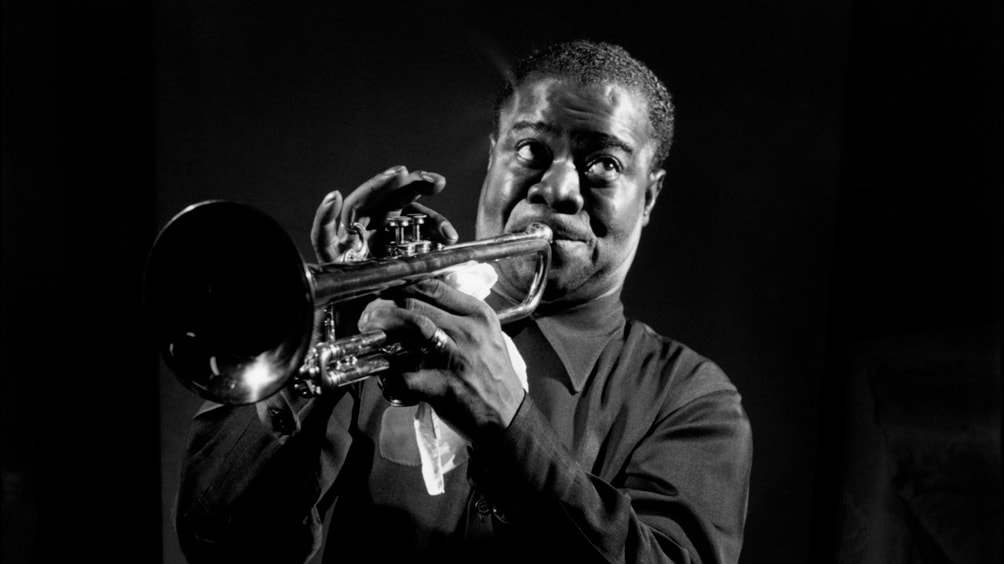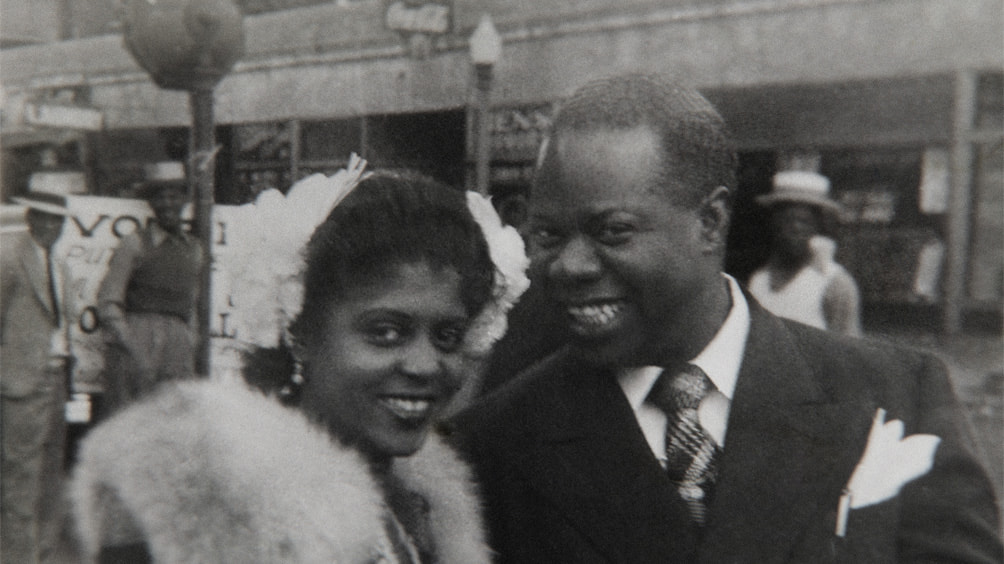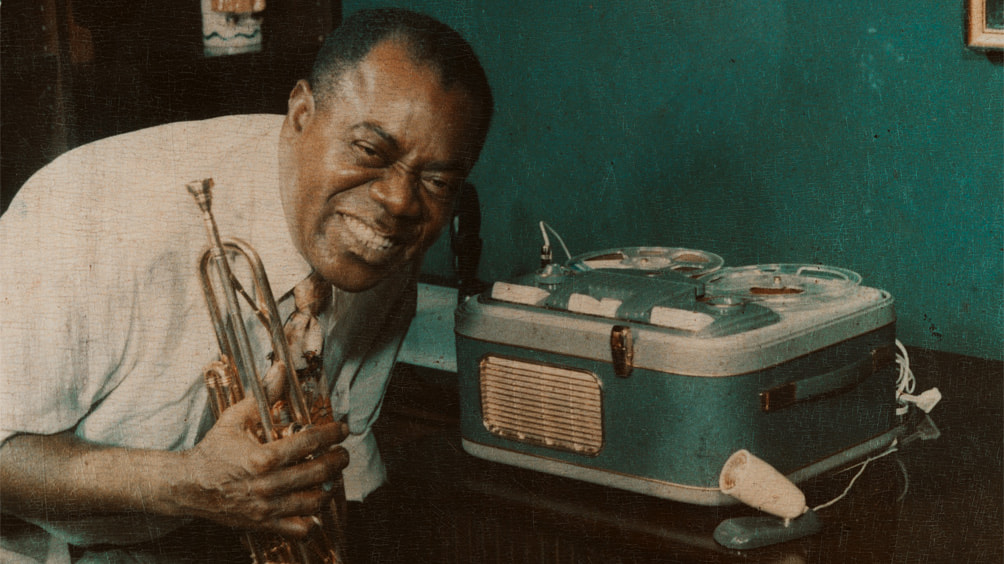
Determining the most influential pop-culture figure of the 20th century is probably a fool’s errand. But if you truly had to choose one, your best bet would be Louis Armstrong. He was one of the forefathers of modern jazz, shaping that art form as we know it today. The story of America, one of both resplendent hopefulness and inhuman oppression, was written in his bones—he turned the Star-Spangled Banner into a fractured anthem of pride and frustration long before Jimi Hendrix did. And to hear and see him—singing in his incomparably expressive purr, hitting one of his famously sweet high C’s on the trumpet, dishing the dirt with amiable savoir faire on a TV talk show—was to love him. Through a career spanning more than half a century, the world came to adore Louis Armstrong, but he truly belonged to America—even if we didn’t deserve him.
Sacha Jenkins’ sublime documentary Louis Armstrong’s Black & Blues entwines Armstrong’s story with that of the century he helped shape, from the Jazz Age, through the Depression and the Civil Rights Movement, to the era of Vietnam and the Cold War. Jenkins pairs rare audio clips from those who knew Armstrong—most notably his wife, Lucille, who made a modest but much-loved home for the couple in Corona, Queens—with footage from Armstrong’s life and career, enlivened by animated collages that appear to be inspired by those Armstrong made himself. (He had a penchant for cutting words and images out of newspapers and magazines and assembling them into witty, fanciful montages laminated with scotch tape, often using his creations to decorate the boxes of his huge collection of homemade tape recordings.) Jenkins—whose documentaries include the 2015 survey of hip-hop fashion Fresh Dressed, as well as Bitchin’: The Sound and Fury of Rick James, from 2021—also mines the wisdom of writers like Stanley Crouch and Amiri Baraka, as well as latter-day trumpeter Wynton Marsalis. Marsalis confesses that, despite the entreaties of his father, pianist and educator Ellis Marsalis, it took him a while to accept Armstrong’s genius; he couldn’t get past Armstrong’s demeanor as an entertainer, which he saw as a kind of Uncle Tom routine designed to pander to white folks. Then, at his father’s behest, he attempted to learn an Armstrong solo—it was so intricate and innovative, so peppered with unreachable notes, that it was beyond him. That was when he knew he’d been wrong about Armstrong, whose gifts as a musician were inextricable from his deeply personable warmth as an entertainer. Armstrong was the whole package, as adored as he was respected, across the globe.

The performance footage chosen by Jenkins shows why: There’s Armstrong as a very young man, taking the stage first in his native New Orleans and later in Chicago, where his career skyrocketed. A 1932 performance of “Mack the Knife” is a marvel of phrasing—the lyrics seem to be surfing the waves of his affable growl. And we hear snippets from several versions of the Star-Spangled Banner, a song Armstrong loved playing and singing, a way of expressing both his gratitude for his country and his grave disappointment in it.
As an entertainer and a public figure, Armstrong both bestowed blessings and accepted them gratefully. A 1960s-era television clip shows him with one of his early music teachers, a gentleman named Peter Davis, describing his young pupil’s gifts. The two stand side-by-side, and it’s impossible to discern who is more pleased. (It was Davis who discovered and nurtured Armstrong’s talent when, at age 13, after a scrape with the law, he was sent to the Colored Waif’s Home for Boys in New Orleans.) Armstrong, among the first to infuse his playing with melodic and rhythmic elements of African music, spoke to the world even without words. We hear his awe at the reception he got during a 1956 trip to Ghana: “They even got my records in the bush; everybody knows Pops.”

Jenkins has made a movie that captures both the joy of Armstrong’s music and the distinctive nature of his personal charisma, though he doesn’t shy away from some of the more controversial elements of Armstrong’s legacy. Armstrong had been criticized at the time for declining to march with other Black entertainers during the Civil Rights Era protests, but he expressed his worries explicitly: he feared that being busted in the chops would mean the end of his life as a musician. Instead, he gave money—and probably quite a bit of it. Armstrong preferred to keep his political views to himself and sometimes came under fire for not being vocal enough about injustices suffered by Black Americans. But Jenkins makes it clear how strong his feelings really were, defending Armstrong’s right to express them in his own way.
Read More: Jerry Lee Lewis, a Rock ‘n’ Roll Legend Who Made as Much Trouble as He Did Music
Even if you think you already know everything about Armstrong, Jenkins will show you more, or at least illuminate new facets of well-known facts. We hear Armstrong speaking of his lifelong devotion to laxatives, especially one brand called Swiss Kriss. We learn that during the Depression, when he was flush thanks to steady work, he gave away free coal to families in need. Louis Armstrong’s Black & Blues is so filled with life that it’s almost a shock, near the end, to see a shot of Armstrong in his coffin, in July 1971, decked out in a typically natty suit, a trumpet lying across the quilted casket liner. He’d been so alive for us only a few minutes earlier; to see him this way is to lose him all over again. But Jenkins restores our equilibrium with a recording of Armstrong’s own voice, speaking of the pleasure he took in a life of performing, a life of no regrets. He signs off with a few words, which we see written in his own hand across the screen: “Bye Bye, Luv Aplenty, Soul Foodly, Satchmo Louis Armstrong.” The show may be over, but the spirit endures.
More Must-Reads from TIME
- Donald Trump Is TIME's 2024 Person of the Year
- TIME’s Top 10 Photos of 2024
- Why Gen Z Is Drinking Less
- The Best Movies About Cooking
- Why Is Anxiety Worse at Night?
- A Head-to-Toe Guide to Treating Dry Skin
- Why Street Cats Are Taking Over Urban Neighborhoods
- Column: Jimmy Carter’s Global Legacy Was Moral Clarity
Contact us at letters@time.com